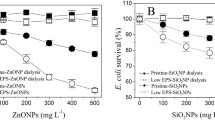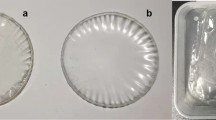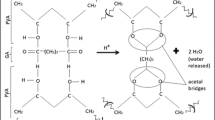Abstract
Encapsulating bacteria within constrained microenvironments can promote the manifestation of specialized behaviors. Using double-emulsion droplet-generating microfluidic synthesis, live Bacillus subtilis bacteria were encapsulated in a semi-permeable membrane composed of poly(ethylene glycol)-b-poly(d,l-lactic acid) (mPEG-PDLLA). This polymer membrane was sufficiently permeable to permit exponential bacterial growth, metabolite-induced gene expression, and rapid biofilm growth. The biodegradable microparticles retained structural integrity for several days and could be successfully degraded with time or sustained bacterial activity. Microencapsulated B. subtilis successfully captured and contained sodium selenite added outside the polymersomes, converting the selenite into elemental selenium nanoparticles that were selectively retained inside the polymer membrane. This remediation of selenium using polymersomes has high potential for reducing the toxicity of environmental selenium contamination, as well as allowing selenium to be harvested from areas not amenable to conventional waste or water treatment.





Similar content being viewed by others
References
Agency for Toxic Substances and Disease Registry (2003) Toxicological profile for selenium (Update). Atlanta
Borg DJ, Bonifacio E (2011) The use of biomaterials in islet transplantation. Curr Diab Rep 11:434–444. doi:10.1007/s11892-011-0210-2
Budde I, Steil L, Scharf C, Volker U, Bremer E (2006) Adaptation of Bacillus subtilis to growth at low temperature: a combined transcriptomic and proteomic appraisal. Microbiol 152:831–853. doi:10.1099/mic.0.28530-0
Chang CB, Wilking JN, Kim S-H, Shum HC, Weitz DA (2015) Monodisperse emulsion drop microenvironments for bacterial biofilm growth. Small 11:3954–3961. doi:10.1002/smll.201403125
Chen S, Cheng S-X, Zhuo R-X (2011) Self-assembly strategy for the preparation of polymer-based nanoparticles for drug and gene delivery. Macromol Biosci 11:576–589. doi:10.1002/mabi.201000427
Chudobova D, Cihalova K, Dostalova S, Ruttkay-Nedecky B, Rodrigo MAM, Tmejova K, Kopel P, Nejdl L, Kudr J, Gumulec J, Krizkova S, Kynicky J, Kizek R, Adam V (2014) Comparison of the effects of silver phosphate and selenium nanoparticles on Staphylococcus aureus growth reveals potential for selenium particles to prevent infection. FEMS Microbiol Lett 351:195–201. doi:10.1111/1574-6968.12353
Cook MT, Tzortzis G, Charalampopoulos D, Khutoryanskiy VV (2014) Microencapsulation of a synbiotic into PLGA/alginate multiparticulate gels. Int J Pharm 466:400–408. doi:10.1016/j.ijpharm.2014.03.034
Danhier F, Ansorena E, Silva JM, Coco R, Le Breton A, Préat V (2012) PLGA-based nanoparticles: an overview of biomedical applications. J Control Release 161:505–522. doi:10.1016/j.jconrel.2012.01.043
Della Porta G, Castaldo F, Scognamiglio M, Paciello L, Parascandola P, Reverchon E (2012) Bacteria microencapsulation in PLGA microdevices by supercritical emulsion extraction. J Supercrit Fluids 63:1–7. doi:10.1016/j.supflu.2011.12.020
DeYoung MB, MacConell L, Sarin V, Trautmann M, Herbert P (2011) Encapsulation of exenatide in poly-(d,l-lactide-Co-glycolide) microspheres produced an investigational long-acting once-weekly formulation for type 2 diabetes. Diabetes Technol Ther 13:1145–1154. doi:10.1089/dia.2011.0050
Dungan RS, Frankenberger WT (1999) Microbial transformations of selenium and the bioremediation of seleniferous environments. Bioremediat J 3:171–188. doi:10.1080/10889869991219299
Estevam EC, Witek K, Faulstich L, Nasim MJ, Latacz G, Dominguez-Alvarez E, Kiec-Kononowicz K, Demasi M, Handzlik J, Jacob C (2015) Aspects of a distinct cytotoxicity of selenium salts and organic selenides in living cells with possible implications for drug design. Molecules 20:13894–13912. doi:10.3390/molecules200813894
Fernandes AP, Gandin V (2015) Selenium compounds as therapeutic agents in cancer. Biochim Biophys Acta 1850:1642–1660. doi:10.1016/j.bbagen.2014.10.008
Fordyce F (2013) Selenium deficiency and toxicity in the environment. In: Selinus O (ed) Essentials of medical geology, 2nd edn. Springer, pp 375–416
Garbisu C, Ishii T, Leighton T, Buchanan BB (1996) Bacterial reduction of selenite to elemental selenium. Chem Geol 132:199–204. doi:10.1016/S0009-2541(96)00056-3
Ho CS, Kim JW, Weitz DA (2008) Microfluidic fabrication of monodisperse biocompatible and biodegradable polymersomes with controlled permeability. J Am Chem Soc 130:9543–9549. doi:10.1021/ja802157y
Holtmann G, Bremer E (2004) Thermoprotection of Bacillus subtilis by exogenously provided glycine betaine and structurally related compatible solutes: involvement of the Opu transporters. J Bacteriol 186:1683–1693. doi:10.1128/JB.186.6.1683-1693.2004
Jain RA (2000) The manufacturing techniques of various drug loaded biodegradable poly(lactide-co-glycolide) (PLGA) devices. Biomaterials 21:2475–2490. doi:10.1016/S0142-9612(00)00115-0
Kailasapathy K (2002) Microencapsulation of probiotic bacteria: technology and potential applications. Curr Issues Intest Microbiol 3:39–48
Lapage SP, Bascomb S (1968) Use of selenite reduction in bacterial classification. J Appl Bacteriol 31:568–580. doi:10.1111/j.1365-2672.1968.tb00407.x
Lopez D, Vlamakis H, Losick R, Kolter R (2009) Paracrine signaling in a bacterium. Genes Dev 23:1631–1638. doi:10.1101/gad.1813709
Makadia HK, Siegel SJ (2011) Poly lactic-co-glycolic acid (PLGA) as biodegradable controlled drug delivery carrier. Polymers (Basel) 3:1377–1397. doi:10.3390/polym3031377
Martino C, Kim SH, Horsfall L, Abbaspourrad A, Rosser SJ, Cooper J, Weitz DA (2012) Protein expression, aggregation, and triggered release from polymersomes as artificial cell-like structures. Angew Chem Int Ed 51:6416–6420. doi:10.1002/anie.201201443
Mayumi D, Akutsu-Shigeno Y, Uchiyama H, Nomura N, Nakajima-Kambe T (2008) Identification and characterization of novel poly(DL-lactic acid) depolymerases from metagenome. Appl Microbiol Biotechnol 79:743–750. doi:10.1007/s00253-008-1477-3
Myers T (2013) Remediation scenarios for selenium contamination, Blackfoot watershed, southeast Idaho, USA. Hydrogeol J 21:655–671. doi:10.1007/s10040-013-0953-8
Nichols DS, Nichols PD, McMeekin TA (1995) Ecology and physiology of psychrophilic bacteria from Antarctic saline lakes and sea-ice. Sci Prog 78:311–348
Olabisi RM (2015) Cell microencapsulation with synthetic polymers. J Biomed Mater Res A 103:846–859. doi:10.1002/jbm.a.35205
Oremland RS, Herbel MJ, Blum JS, Langley S, Beveridge TJ, Ajayan PM, Sutto T, Ellis AV, Curran S (2004) Structural and spectral features of selenium nanospheres produced by Se-respiring bacteria. Appl Environ Microbiol 70:52–60. doi:10.1128/AEM.70.1.52-60.2004
Prakash S, Tomaro-Duchesneau C, Saha S, Cantor A (2011) The gut microbiota and human health with an emphasis on the use of microencapsulated bacterial cells. J Biomed Biotechnol 2011:981214
Sambrook J, Russell D (2001) Molecular cloning: a laboratory manual, 3rd edn. Cold Spring Harbor Laboratory Press, Cold Spring Harbor
Setlow P (2013) Summer meeting 2013—when the sleepers wake: the germination of spores of Bacillus species. J Appl Microbiol 115:1251–1268. doi:10.1111/jam.12343
Tran PA, Webster TJ (2013) Antimicrobial selenium nanoparticle coatings on polymeric medical devices. Nanotechnology 24:155101. doi:10.1088/0957-4484/24/15/155101
U.S. Environmental Protection Agency (1991) Integrated risk information system (IRIS): selenium and compounds. Washington, D.C.
Utada AS, Lorenceau E, Link DR, Kaplan PD, Stone HA, Weitz DA (2005) Monodisperse double emulsions generated from a microcapillary device. Science 308:537–541. doi:10.1126/science.1109164
Wallenberg M, Misra S, Bjornstedt M (2014) Selenium cytotoxicity in cancer. Basic Clin Pharmacol Toxicol 114:377–386. doi:10.1111/bcpt.12207
Wang Q, Webster TJ (2013) Nanostructured selenium—a novel biologically-inspired material for antibacterial medical device applications. In: Biomimetics. Wiley, Inc., pp. 203–220
Wang Q, Larese-Casanova P, Webster TJ (2015) Inhibition of various gram-positive and gram-negative bacteria growth on selenium nanoparticle coated paper towels. Int J Nanomedicine 10:2885–2894. doi:10.2147/IJN.S78466
World Health Organization (1996) Trace elements in human nutrition and health. WHO, Geneva
Wu L (2004) Review of 15 years of research on ecotoxicology and remediation of land contaminated by agricultural drainage sediment rich in selenium. Ecotoxicol Environ Saf 57:257–269. doi:10.1016/S0147-6513(03)00064-2
Yano K, Wada T, Suzuki S, Tagami K, Matsumoto T, Shiwa Y, Ishige T, Kawaguchi Y, Masuda K, Akanuma G, Nanamiya H, Niki H, Yoshikawa H, Kawamura F (2013) Multiple rRNA operons are essential for efficient cell growth and sporulation as well as outgrowth in Bacillus subtilis. Microbiology 159:2225–2236. doi:10.1099/mic.0.067025-0
Zhang Y, Ho Y-P, Chiu Y-L, Chan HF, Chlebina B, Schuhmann T, You L, Leong KW (2013) A programmable microenvironment for cellular studies via microfluidics-generated double emulsions. Biomaterials 34:4564–4572. doi:10.1016/j.biomaterials.2013.03.002
Acknowledgments
Special thanks to Alireza Abbaspourrad and David A. Weitz for the demonstration of double-emulsion microfluidic device assembly techniques.
Author information
Authors and Affiliations
Corresponding author
Ethics declarations
Funding
This work was supported in part by the National Science Foundation (NSF) DGE-0965843, Department of Defense (DOD) W81XWH-09-2-0001, National Cancer Institute (NCI) 1R25CA174650-01A, a startup grant from Northeastern University, and the Electronics Materials Research Institute at Northeastern University. Undergraduates J.B., K.G., and C.K. were supported by the Northeastern University Provost Undergraduate Research Award, Honors Early Research Grant, and Advanced Research/Creative Endeavor Award.
Conflict of interest
The authors declare that they have no conflict of interest.
Ethical approval
This article does not contain any studies with human participants or animals performed by any of the authors.
Additional information
Jacob Barlow and Kevin Gozzi contributed equally to this work.
Rights and permissions
About this article
Cite this article
Barlow, J., Gozzi, K., Kelley, C.P. et al. High throughput microencapsulation of Bacillus subtilis in semi-permeable biodegradable polymersomes for selenium remediation. Appl Microbiol Biotechnol 101, 455–464 (2017). https://doi.org/10.1007/s00253-016-7896-7
Received:
Revised:
Accepted:
Published:
Issue Date:
DOI: https://doi.org/10.1007/s00253-016-7896-7




